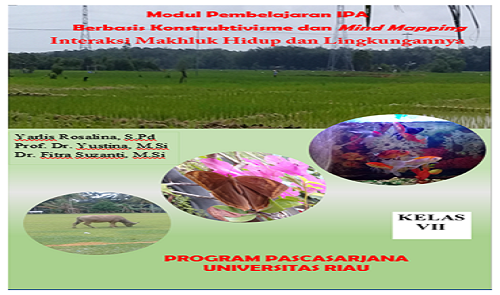
Constructivism-Based Learning Module for Middle School Students' Creative Thinking on the Interaction of Living Things and Their Environments
Abstract
Keywords
Full Text:
PDFReferences
Acesta, A. (2020). Pengaruh penerapan metode mind mapping terhadap kemampuan berpikir kreatif siswa. NATURALISTIC: Jurnal Kajian Penelitian Pendidikan dan Pembelajaran, 4(2b), 581-586.
Alharthi, M., & Alsufyani, N. (2020). Constructivism As A Learning Theory Applied To Thinking In Solving Physics Problems: An Interpretive Study. International Journal of Education and Research, 8(3).
Angela, L. (2019). Pengembangan Modul Fisiologi Tumbuhan Berorientasi Konstruktivisme Dilengkapi Peta Pikiran. Tarbawi: Jurnal Ilmu Pendidikan, 15(1), 107-117.
Djandji Purwanto. (2014). Pengembangan Perangkat Pembelajaran: Silabus, RPP, PHB, Bahan Ajar, Gava Media: Yogyakarta.
Hake, R. (2007). Analizying Change/ Gain Score. (online) Tersedia: http://lists.asu.edu (2 Februari 2018).
Hidayati, N. U. R. (2020). Pengembangan Modul Pembelajaran tentang Perubahan Lingkungan Berbasis Konstruktivisme untuk Meningkatkan Keterampilan Berpikir Kritis dan Kreatif (Doctoral dissertation, IAIN SALATIGA).
Qomariyah, D. N., & Subekti, H. (2021). Analisis kemampuan berpikir kreatif. Pensa: e-jurnal pendidikan sains, 9(2), 242-246.
Nurdalilah, N., & Arifitriana, W. (2019). Pengembangan Bahan Ajar Analisis Real Berbasis Konstruktivisme Pada Program Studi Pendidikan Matematika Universitas Graha Nusantara. Jurnal ESTUPRO, 4(3), 22-37.
Rahardjanto, A. (2019). Hybrid-PjBL: Learning Outcomes, Creative Thinking Skills, and Learning Motivation of Preservice Teacher. International Journal of Instruction, 12(2), 179-192.
Simamora, S. S., Harahap, R., Yanti, I., & Indonesia, P. S. U. (2020). The Influence of Mind Mapping Learning Method on Student Learning Results. International Journal of Innovative Science and Research Technology, Issue, 801-803.
Yuningsih, E., Retnowati, R., & Jaenudin, D. (2018). Pembelajaran berbasis masalah dengan mind map untuk meningkatkan penguasaan konsep dan keterampilan berpikir kreatif siswa smp pada tema pencemaran lingkungan. Journal of science education and practice, 2(2), 47-63.
Yustina. (2019). Implementasi Konstruktivisme dalam Pembelajaran Biologi (Lingungan Hidup), UR Press, Pekanbaru.
Yustina, Y., Syafii, W., & Vebrianto, R. (2020). The effects of blended learning and project-based learning on pre-service biology teachers’ creative thinking through online learning in the Covid-19 pandemic. Jurnal Pendidikan IPA Indonesia, 9(3), 408-420.
Zubaidah, S., Fuad, N. M., Mahanal, S., & Suarsini, E. (2017). Improving creative thinking skills of students through differentiated science inquiry integrated with mind map. Journal of Turkish Science Education, 14(4), 77-91.
DOI: http://dx.doi.org/10.31258/jes.5.4.p.687-701
Refbacks
- There are currently no refbacks.
Copyright (c) 2021 Yarlis Rosalina, Yustina Yustina, Fitra Suzanti

This work is licensed under a Creative Commons Attribution 4.0 International License.
Publisher: FKIP Universitas Riau













